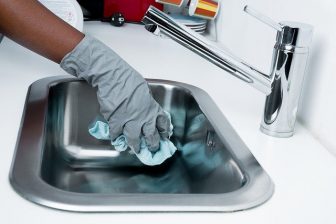 The landlords claimed for cleaning, damage, redecoration, removal of belongings and the cost of a contractor to supervise all works to beundertaken.
The landlords claimed for cleaning, damage, redecoration, removal of belongings and the cost of a contractor to supervise all works to beundertaken.
Looking at the cleaning claim first, the landlord claimed for a full professional clean of the property at the end of the tenancy. A quotation for an end of tenancy clean of the property, to include carpets, was provided as evidence.
While the tenancy agreement contained a clause that stated the property had been professionally cleaned for the start of the tenancy, the independent inventory clerk considered that the property had in fact been cleaned to a domestically high standard. This set the required standard of cleanliness for the tenants at the end of the tenancy.
Although the property was not cleaned to a professional standard at the start of the tenancy, given the extent of cleaning required at the end of the tenancy – supported with a detailed check-out report and supporting photographs – a reduced award was found to be reasonable. The carpets, appliances and windows required cleaning to return them to the standard of cleanliness they were in at the start of the tenancy.
To award for a full professional clean would place the landlord in a position of betterment, which the landlord is not entitled to, given there was no recorded evidence – either in the check in report or in the form of a cleaning receipt – of a professional clean being undertaken at the start of the tenancy.
 Turning now to the various claims for damage. Aside from the costings provided by the landlords’ surveyor, no invoices, estimates, or quotations were provided. The adjudicator found that it was not possible to make awards for several of the individual claims made. For example, a missing towel rail cap and bracket or a defective waste mechanism; either the independent inventory clerk considered any change in condition to be within the scope of fair wear and tear, or the claims were not substantiated with evidence as the items claimed for were recorded in the check out report as ‘as per check in’.
Turning now to the various claims for damage. Aside from the costings provided by the landlords’ surveyor, no invoices, estimates, or quotations were provided. The adjudicator found that it was not possible to make awards for several of the individual claims made. For example, a missing towel rail cap and bracket or a defective waste mechanism; either the independent inventory clerk considered any change in condition to be within the scope of fair wear and tear, or the claims were not substantiated with evidence as the items claimed for were recorded in the check out report as ‘as per check in’.
However, concerning the remaining claims, the adjudicator was satisfied that the condition of various aspects of the property had, in parts, either deteriorated during the tenancy, or deteriorated further during the tenancy. When deciding on the amount to award, the adjudicator considered:
- The length of the tenancy and the number of occupants
- The condition of the subject items/areas as noted at the start, and at the end, of the tenancy
- Theremaining expected life span of the subject items/areas in a tenanted property, bearing in mind that some areas are deemed to be high traffic/usage areas
- An appropriate allowance for fair wear and tear (although the scope of this does not extend to cleaning)
- The extent of the damage/deterioration evident, as well as the extent of the work required to rectify the issue
- The principle that a tenant’s deposit is not considered an insurance policy from which a landlord might expect to be reimbursed on a “new for old”basis, as this would constitute betterment.
In this case, the adjudicator found that some award was justified. For example, fixing handles to cupboard doors and handles to the WC and bathroom, burn marks to the floor, heavy watermarks to the kitchen worktop, a damaged kitchen splashback and a contribution towards the replacement of a bedroom carpet, which was recorded to have several burn marks at the end of the tenancy. The check-out report also supported the claims for defective light bulbs, an extractor hood light bulb and a smoke detector battery.

Moving on to the claims for redecoration and removal of belongings, a contribution was awarded due to filler marks, heavy scuffs, holes, chips and dents, staining to walls and pen marks, all of which were found to be outside the scope of fair wear and tear. The evidence also supported an award for the making good following removal of strip lights, and a satellite dish, added by the tenants during the tenancy. The tenants acknowledged that they had left items behind by mistake,, the check-out report provided further detail as to the size and number of items to be removed, so an award for the reasonable cost of removal was made here too.
Lastly, no award was made for the supervisory costs of the contractor, under the Tenant Fees Act 2019, a tenant cannot be charged for the services of a third party.
Key factors:
- Claims should only be made against the deposit for matters substantiated with evidence. Here, numerous claims were not supported as they were either deemed to be within the scope of fair wear and tear, or were not supported by the check-out report findings.
- Check out our guide to Inventories and check-in/check-out reports for the level of detail required to be captured.
- When making many deductions across various heads of claim, use our Deposit Deduction Template to do this. It is available for use by our members.
- Consider fair wear and tear and the principle of betterment when deciding whether a proposed claim is justified.
- Seek the most appropriate remedy, for example, a contribution towards redecoration or replacement instead of the full cost, as the adjudicator will need to consider the factors noted above.
- A tenancy agreement usually contains an obligation for a tenant to seek permission before making any alteration or additions to the property. Keep an audit trail of permissions sought and obtained, and any conditions that may be attached.
- Book a place on our TDS Academy – Foundation Course and Adjudication Workshops. We also run on-demand courses with our Partner Inventory Hive.
If you are interested in further guidance relating to deposit disputes, visit the Information Lounge at TDS to browse further guides.
Sandy Bastin is head of dispute resolution at TDS.


‘Standard clauses’ in tenancy agreements requiring professional clean and cleaning of carpets at end of tenancy are outlawed and have been for many years.
You must be logged in to like or dislike this comments.
Click to login
Don't have an account? Click here to register